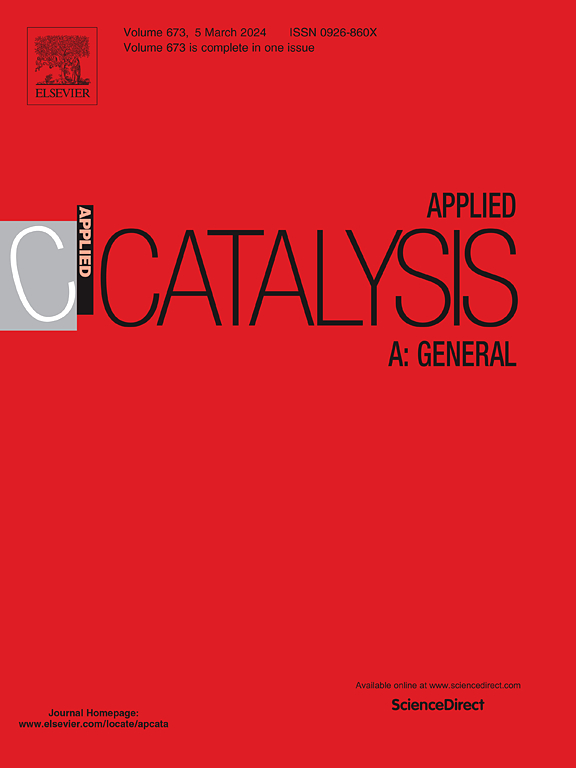掺杂聚乙二醇的金属掺杂Cu/ZnO/Al2O3催化剂对CO2加氢制甲醇的催化活性增强
IF 4.8
2区 化学
Q2 CHEMISTRY, PHYSICAL
引用次数: 0
摘要
对温室气体排放的日益关注推动了对可持续碳利用策略的重要研究。其中,二氧化碳催化加氢制甲醇已成为一种有前途的方法,既提供碳捕获又提供增值化学生产。本研究采用增强共沉淀法合成了Cu/ZnO/Al2O3 (CZA)催化剂,并添加了聚乙二醇(PEG)表面活性剂,以改善其孔隙率和表面功能。此外,还引入了Ga和Ti作为促进剂来提高催化性能。催化性能测试表明,ti掺杂CZA催化剂(Ti-CZA-3PG)在280℃、50 bar条件下,CO2转化率最高(35.6 %),甲醇时空产率最高(312.6 mmol/(gcat∙h)),甚至超过了商业催化剂。由于Cu-ZnO相互作用增强,氧空位增加了活性位点,抑制了逆向水气转换反应,确保了更高的甲醇选择性,从而提高了性能。本研究强调了聚乙二醇辅助合成和杂金属掺杂的协同效应,为优化cu基催化剂的CO2加氢制甲醇提供了有效的策略。本文章由计算机程序翻译,如有差异,请以英文原文为准。
Enhanced catalytic activity of metal-doped Cu/ZnO/Al2O3 catalyst incorporated polyethylene glycol for CO2 hydrogenation to methanol
The increasing concerns over greenhouse gas emissions have driven significant research into sustainable carbon utilization strategies. Among these, the catalytic hydrogenation of CO2 to methanol has emerged as a promising approach, offering both carbon capture and value-added chemical production. In this study, a Cu/ZnO/Al2O3 (CZA) catalyst was synthesized via an enhanced co-precipitation method with adding polyethylene glycol (PEG) surfactant to improve porosity and surface functionality. Additionally, Ga and Ti were introduced as promoters to enhance catalytic performance. Catalytic performance tests demonstrated that the Ti-doped CZA catalyst (Ti-CZA-3PG) exhibited the highest CO2 conversion (35.6 %) and space-time yield (STY) of methanol (312.6 mmol/(gcat∙h)) at 280 °C under 50 bar, even outperforming a commercial catalyst. The improved performance is attributed to enhanced Cu-ZnO interaction, increased active sites due to oxygen vacancies, and suppression of the reverse water-gas shift reaction, ensuring higher methanol selectivity. This study highlights the synergistic effects of PEG-assisted synthesis and hetero-metal doping, presenting an effective strategy for optimizing Cu-based catalysts for CO2 hydrogenation to methanol.
求助全文
通过发布文献求助,成功后即可免费获取论文全文。
去求助
来源期刊

Applied Catalysis A: General
化学-环境科学
CiteScore
9.00
自引率
5.50%
发文量
415
审稿时长
24 days
期刊介绍:
Applied Catalysis A: General publishes original papers on all aspects of catalysis of basic and practical interest to chemical scientists in both industrial and academic fields, with an emphasis onnew understanding of catalysts and catalytic reactions, new catalytic materials, new techniques, and new processes, especially those that have potential practical implications.
Papers that report results of a thorough study or optimization of systems or processes that are well understood, widely studied, or minor variations of known ones are discouraged. Authors should include statements in a separate section "Justification for Publication" of how the manuscript fits the scope of the journal in the cover letter to the editors. Submissions without such justification will be rejected without review.
 求助内容:
求助内容: 应助结果提醒方式:
应助结果提醒方式:


